Document-Based Questions: Warm & Cool Feedback Transcript
Jennifer Wolfe (in class): We are going to move into our partnerships that we've already established and you're going to give feedback to your partner about their writing.
Jennifer Wolfe: This is the second day of a three day lesson on how to write a document based question for the world history AP exam.
Jennifer Wolfe (in class): Before we start, we have your essay on your desk if your have one. And you have your documents on your desk.
Jennifer Wolfe: Yesterday, we spent reading examples of document based questions that I got off the college board website. Then I gave them the questions with the documents and they read them overnight and constructed an essay. So, today, they brought their essays in and they sat in their learning pairs and they gave each other feedback. We call it warm and cool feedback.
Jennifer Wolfe (in class): Today, we're going to continue with the warm and cool feedback that we started in English class yesterday, only now we are gonna use our document based question that you've been working on for about the last three days.
[00:01:11;19]
Jennifer Wolfe: Warm and cool feedback is a way to give your students information about their work. Warm feedback tells them what they did well. Cool feedback shows them where they are weak and I find that using it with students lets them see exactly in their essay where they did or did not accomplish the task and it doesn't intimidate them because I'm not saying, "this is terrible." I'm not saying, "great! always great!" No. I'm giving them very specific evidence using their own words.
Jennifer Wolfe (in class): We all wanna be better writers so we do better on the exam and you don't make me nuts.
Jennifer Wolfe: The rules of warm and cool feedback are very simple. A student, before they give their paper to their learning partner - they pick two goals that they have for their writing.
Jennifer Wolfe (in class): What you want to do is take a look at the document based question rubric and you want to decide on two or three things you would like your partner to read for specifically in your essay. What two or three areas do you think you did well on maybe and you wanna get some feedback on that or maybe there are areas that you had trouble with.
[00:02:23;23]
Jennifer Wolfe: When they are attempting to pick their goals, the AP DBQ rubric is always in front of them. I expose the students to that rubric as much as possible because - on the AP test, they don't get the rubric. They have to have that internalized. The more it becomes second nature to them, that it exists, that I have to use it as a check list, that it's a guide for my writing - the better off they'll be on the test that day.
Jennifer Wolfe (in class): What's one of your goals, Nathan?
Student: To analyze the documents rather than summarize them.
Jennifer Wolfe (in class): Joanna.
Student: To write a better thesis and explain them better using quotes.
Jennifer Wolfe (in class): Excellent. Besides using the DBQ rubric for your goals and reading your paper, I also want you to read your thesis - or what you think is your thesis - aloud.
Jennifer Wolfe: Ninth graders are not great at recognizing what a thesis is. Even if I give them student samples where I know there is a thesis - they oftentimes don't know where it's located. So, this way. I have them read it aloud, and then their partner will respond to their read aloud.
[00:03:31;27]
Jennifer Wolfe (in class): So, I'd like you try that first and then, once you have done that you may exchange papers. I'm gonna give everybody a sheet of paper. I would like you to make a t-chart on this paper.
Jennifer Wolfe: The person who is receiving the feedback has a piece of paper out, with a t-chart on it - with warm at the top and cool at the top of the other side of the t-chart. I don't need them to write in complete sentences - I tell them, "don't focus on that." What are you hearing that needs to be fixed in your paper.
Jennifer Wolfe (in class): So tonight, when you've forgotten about this class - when you go home and you pull out that paper to rewrite this essay - you know what's going on. Okay? What you're gonna do is, you're gonna get into your learning pairs and what's the first thing you are doing?
Student: Reading your thesis aloud?
Jennifer Wolfe (in class): Ok. Do it now.
Jennifer Wolfe: The DBQ is especially difficult for 9th graders because the reading level is very high. They're reading text in its original language and they have to organize these documents. It really stresses them out.
[00:04:34;23]
Jennifer Wolfe (in class): Is there anyone missing a partner? Anybody missing a partner?
Jennifer Wolfe: They pass the papers - their essays, to their partner. And they read what they think is their thesis aloud.
Student: Religion is often the answer to many conflicts within government policies and social hierarchy.
Jennifer Wolfe: I do a little thing where I ask the one who's more tired to read to the one who's less tired. That way, that student is engaged, he becomes energized and he's active.
Student: The religions, Christianity, Buddhism and Hinduism, Confucianism and Taoism are all based off one central belief in a higher godlike figure and they all must follow a set of guidelines in order to be accepted into heaven and the afterlife.
Jennifer Wolfe: They do the reading of their peer's paper and then once that's been done, they then take away warm and cool feedback handout which we give them and they fill out the prompts.
[00:05:32;25]
Jennifer Wolfe: Once they have completed all of the feedback - both warm and cool feedback on the sheet, then the students do the sharing process.
Student: How you explained how each religion emerged and how they worked was really good and how you expanded on it with background knowledge helped a lot. And your sentences was - you kept it interesting.
Jennifer Wolfe: They are asked to use evidence out of their partner's writing to back up their feedback. It helps them focus on the areas which are weak or, in fact, strong in their writing.
Student: And for cool feedback, I said, "how could you fit all your ideas and analyzation into a smaller frame of time? It seems like you took a really long time on this and you’re not gonna have enough time for the actual thing when it comes."
Jennifer Wolfe: It's a vulnerable process. To write. And especially when you're a 9th grader and you're very self-conscious. It needs to take place in a space that's safe and that has very clear rules and definitions.
[00:06:40;01]
Student: All my bodies don't connect to my thesis, how can I reflect my thesis onto all my other paragraphs?
Student: Sometimes I like to write my whole essay out first and then I like to see how my thesis reflects on my essay.
Jennifer Wolfe: It's often less intimidating for the kids when they work in pairs. As opposed to me at the desk with them individually. They have become very familiar with one another - they've learned to trust one another - so they're willing to take risks in the partnerships.
Jennifer Wolfe (in class): So, what can Matt do for you right now?
Student: I could help him organize his essay better - his thesis so maybe he has more ideas of what he can do to go forward with his essay.
Jennifer Wolfe: The only direction they get is to organize all of the documents in a way that makes sense for their response to the question. Whatever their thesis is, the organization of the documents would reflect that.
Student: Using outside information about Zoroastrianism -
Jennifer Wolfe (in class): Oh great! Good, Nathan.
[00:07:41;11]
Student: - he's summarizing the - tied it to his analysis when he starts -
Jennifer Wolfe (in class): Nice. And how do you know he has analysis in their, Andrew?
Student: Well, he starts to answer the question that he says he'll answer in his thesis right here. When he starts talking about all the details from the documents.
Jennifer Wolfe (in class): Okay, but does he summarize or does he analyze?
Student: He summarizes in the -
Jennifer Wolfe (in class): Show me - yes, great.
Student: - and then he - his analysis starts -
Jennifer Wolfe (in class): "Monotheistic religions like Judaism and Christianity are easier for people to follow because they only need to know one god and they also justify the existence of the supreme ruler like an emperor or king." So, you're saying the religion and the political structure were parallel - or they mirrored one another. Yeah, ok. "For example, a document about Islam, the third Abrahamic religion would provide more insight into how similar these three religions are - about their roots both in teachings and locations." That's interesting that you say that and I think that's a very valid voice. That was great. And I'm really proud of you for seeing the difference between analysis and description. That's hard.
[00:08:45;05]
Jennifer Wolfe: When it's one on one or you're in a pair, that's a nice close warm place where they can do some good writing, where they can get feedback that's helpful and not critical so that they can become better writers.
Jennifer Wolfe (in class): Tell me in the text where you see where the poor might be attracted to his teachings.
Student: It says, "blessed are the poor and disparate for theirs is the kingdom of heaven." It's saying people from all walks of life have the opportunity to - it's gonna be okay, basically.
Jennifer Wolfe (in class): And, in particular, who is his message for? Who's the audience for this sermon?
Student: The lower class. So it appeals to the lower class.
Jennifer Wolfe (in class): And it's telling them, hang in there. In your next life, you'll reach salvation.
Jennifer Wolfe: Once they have completed all of the sharing process, they then give the papers back to their partner and then they go home tonight and they will revise based on what they've heard. When they hand it in to me, they will get the warm and cool feedback sheet and the revised essay but I also asked for the one they shared with their partner as well. So I can see if their was changing or growth or what they did to meet their partner's expectations or feedback.
Jennifer Wolfe (in class): We read, we reflect on our reading, we revise our readings and writings and then we rewrite. Right? Everybody's good? Okay. Thanks a lot everybody.
[00:10:39;17]
END

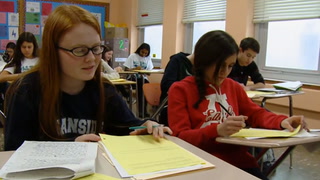
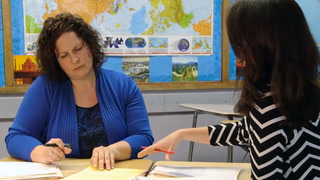
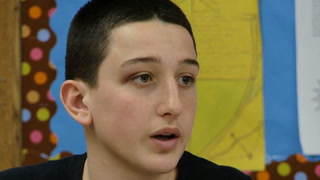
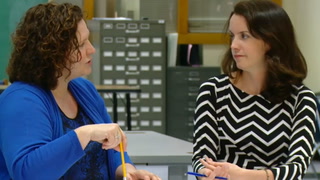
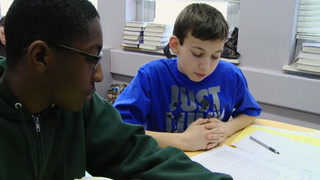








15 Comments
Erin Zost Dec 13, 2021 11:23am
The use of the "warm and cool" feedback is a very interesting way for students to improve their writing. The feedback will help their final paper and make them a better writer on their next report. I like that the teacher has them turn in the first draft, feedback sheet, and final paper to see the growth.
Mya Neric Apr 27, 2018 2:59am
Ashley Ho Apr 25, 2018 3:55pm
Lisa-Brit Wahlberg Jan 21, 2017 2:51pm
Courtney Durrant Nov 22, 2016 2:41pm